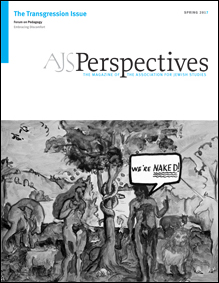Dear Colleagues,
Transgression signifies crossing a line, breaching a barrier. The authors in this thought-provoking issue of AJS Perspectives have mused about transgression in diverse ways. Some explored personal transgressions; others consider that the subjects they study, like conversion and sexual impropriety, are, by their very nature, transgressive. While our Perspectives authors have talked mostly about the past, I intend to discuss the present.
For some time now, we have all watched the humanities being pushed aside, put on the defensive. Faculty lines in history and literature departments have vanished. At American University, where I have taught for more than thirty years, the provost calls on the faculty to envision areas of strength for the future, and not one of his minyan of topics—starting with neuroscience, big data, game design, and persuasive play—lies in the humanities. The American Historical Association urges revising doctoral training to add skills routinely taught in business school—communication, collaboration, and quantitative literacy—so that our students can better prepare to earn a living when they leave our nests. Calls to eliminate the National Endowment for the Humanities and the National Endowment for the Arts have been renewed.
I know that university curricula have changed dramatically over the centuries. Once Latin, Greek, and the classics of Western Civilization formed its core. Then a generation, clamoring to open the humanities, critiqued their privileging of the works of dead white men. One result: Jewish Studies marched into the academy.
But pushing aside the humanities to make way for game design is not the same as the antipathy currently expressed for the values and methodologies that lie at the core of our humanistic enterprise. This feels new. A line has been crossed; a barrier transgressed.
I am, of course, not the first to make this observation. Leon Botstein, president of Bard College, wrote a few months ago in the New York Times that the university, its values, and our scholarly methodologies are under attack. We rest our scholarship on verifiable facts, rational analysis, and reasoned argument. We employ rigorous skepticism. We honor the distinction between truth and falsehood. We insist upon conclusions that follow logically from evidence.
So what can we at AJS do to stem the attack?
In 2013, after serious and thoughtful debate, the AJS Board of Directors amended our mission statement to emphasize that, not only do we seek to advance Jewish Studies research and teaching at institutions of higher learning, but also added the words "to foster greater understanding of Jewish Studies scholarship among the wider public."
Now, more than ever, we can no longer afford to remain within our ivory towers, spending our days researching and writing, interrupted only by bouts of teaching and meetings with students and colleagues. We must, as our contribution to the defense of our academic enterprise, share the fruits of our scholarship with wider publics.
Many of us have long engaged the public. My own work included giving more than forty public lectures the year American Jewry celebrated its 350th anniversary and helping create the core exhibition of the National Museum of American Jewish History. Many AJS members have long lists of scholarly interactions with the public.
At AJS we are working to help our members hone skills needed to address audiences outside the university. This summer, thanks to the initiative of AJS Vice President for Membership and Outreach Jeffrey Veidlinger, a dozen AJS members will spend a week with Columbia University Professor Samuel Freedman, the noted New York Times journalist, thinking about how to transform scholarly writing to reach audiences beyond the academy. If you missed Michael Carasik's AJS webinar on creating and promoting podcasts, one of the benefits of your AJS membership is online access to that.
Last December, at the conclusion of our annual conference, our first cohort of Legacy Heritage Fellows, graduate students whose final year of dissertation writing was generously supported by a grant from AJS, met with our colleagues Julia Phillips Cohen and past AJS President Jeffrey Shandler and "The Professor Is In" Karen L. Kelsky to learn how to deliver a public lecture about their dissertations. We expect that the lectures they give this spring will be the first of many opportunities for them to share their scholarship with wider audiences.
At AJS we will continue promoting our members speaking to wider publics. We also remain committed to defending our scholarly enterprise, its values, and its methodologies, in the university and beyond.
Pamela S. Nadell
American University

